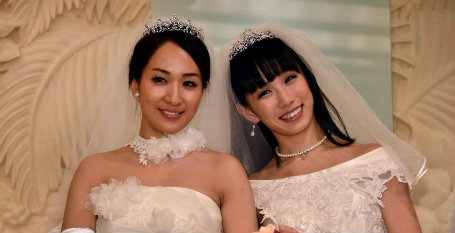While a ward in Tokyo is offering partnership certificates to gay couples, a university has scraped cross-dressing events because it deems it offensive.
Media recently reported that a lesbian couple held a symbolic wedding ceremony after Shibuya Ward in Tokyo passed a resolution to issue “partnership” certificates to gay couples. This act is not legally binding as the Japanese Constitution recognizes only marriages between two sexes but it nonetheless remains the first to recognize same-sex unions in Japan.
Actresses Ayaka Ichinose, 34, and Akane Sugimori, 28 got “married” in Shinjuku Ward in the presence of friends and family but know that their registration of it at a municipality office will be rejected.
“We held the wedding ceremony so that it might become easier for others to do the same in the future,” Sugimori told the media afterward.
In contrast, a fund-raising event at the University of Tsukuba in Ibaraki Prefecture, where male students dress up in women’s clothing offer kisses was cancelled even though it has a 20-year history.
The “menu” included kisses on the hand for 100 yen ($0.83), pecks on the cheek for 200 yen, and smooches on the forehead for 300 yen.
The event widely publicized on the Internet is run by first-year students of the School of Art Design was cancelled after the school received about 10 complaints.
This is “a sign of the growing awareness of the realities facing Japan’s LGBT community,” reports The Asahi Simbun.
“I believe people can rid themselves of prejudice if they can have a little more empathy and understanding toward others,” Tomoya Shiraishi, a 22-year-old senior at Ritsumeikan University in Kyoto, was quoted as saying.
Such contrast can even be seen within the ruling family. Akie Abe, wife of the Japanese prime minister took part in last year’s annual Tokyo gay parade and even wrote about equality and anti-gay discrimination on her Facebook page.
But Prime Minister Shinzo Abe responding to Shibuya Ward’s symbolic act, told parliament that same-sex marriages were never considered by the Constitution and that it would be difficult to revise provisions concerning rights that are enshrined because it "concerns the foundation of how families in our country should be."
Last year, a nationwide poll by Kyodo News and 38 of its member news organizations across Japan found three in four Japanese adults surveyed think society is either unkind or somewhat unkind to gay and transsexual people. On same-sex marriage, which is not legally recognized in Japan, 52.4 percent said they oppose or somewhat oppose it.
Same-sex relations were legalized way back in 1880 in Japan and although Japanese culture does not have a history of hostility toward LGBT people, they nonetheless lack legal recognition and are often subjected to social discrimination.
While a ward in Tokyo is offering partnership certificates to gay couples, a university has scraped cross-dressing events because it deems it offensive.
Media recently reported that a lesbian couple held a symbolic wedding ceremony after Shibuya Ward in Tokyo passed a resolution to issue “partnership” certificates to gay couples. This act is not legally binding as the Japanese Constitution recognizes only marriages between two sexes but it nonetheless remains the first to recognize same-sex unions in Japan.
Actresses Ayaka Ichinose, 34, and Akane Sugimori, 28 got “married” in Shinjuku Ward in the presence of friends and family but know that their registration of it at a municipality office will be rejected.
“We held the wedding ceremony so that it might become easier for others to do the same in the future,” Sugimori told the media afterward.
In contrast, a fund-raising event at the University of Tsukuba in Ibaraki Prefecture, where male students dress up in women’s clothing offer kisses was cancelled even though it has a 20-year history.
The “menu” included kisses on the hand for 100 yen ($0.83), pecks on the cheek for 200 yen, and smooches on the forehead for 300 yen.
The event widely publicized on the Internet is run by first-year students of the School of Art Design was cancelled after the school received about 10 complaints.
This is “a sign of the growing awareness of the realities facing Japan’s LGBT community,” reports The Asahi Simbun.
“I believe people can rid themselves of prejudice if they can have a little more empathy and understanding toward others,” Tomoya Shiraishi, a 22-year-old senior at Ritsumeikan University in Kyoto, was quoted as saying.
Such contrast can even be seen within the ruling family. Akie Abe, wife of the Japanese prime minister took part in last year’s annual Tokyo gay parade and even wrote about equality and anti-gay discrimination on her Facebook page.
But Prime Minister Shinzo Abe responding to Shibuya Ward’s symbolic act, told parliament that same-sex marriages were never considered by the Constitution and that it would be difficult to revise provisions concerning rights that are enshrined because it "concerns the foundation of how families in our country should be."
Last year, a nationwide poll by Kyodo News and 38 of its member news organizations across Japan found three in four Japanese adults surveyed think society is either unkind or somewhat unkind to gay and transsexual people. On same-sex marriage, which is not legally recognized in Japan, 52.4 percent said they oppose or somewhat oppose it.
Same-sex relations were legalized way back in 1880 in Japan and although Japanese culture does not have a history of hostility toward LGBT people, they nonetheless lack legal recognition and are often subjected to social discrimination.

